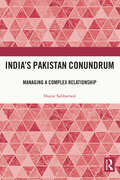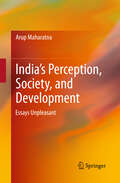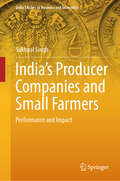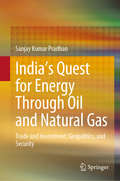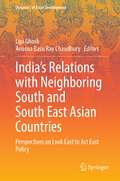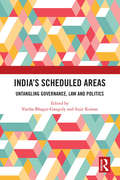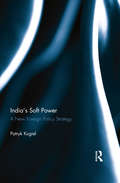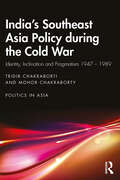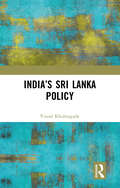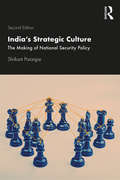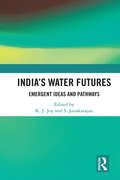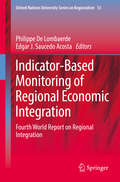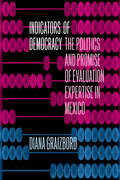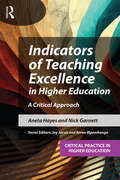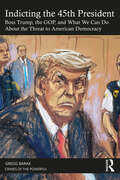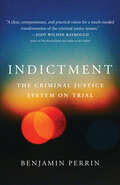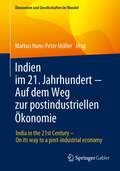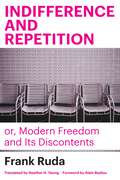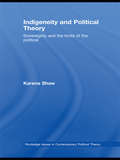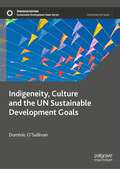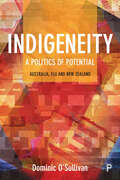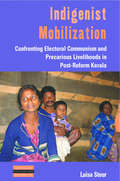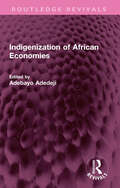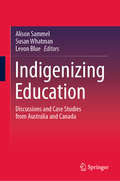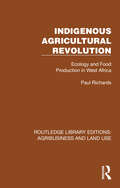- Table View
- List View
India’s Pakistan Conundrum: Managing a Complex Relationship
by Sharat SabharwalHistorically, the relationship between India and Pakistan has been mired in conflicts, war, and lack of trust. Pakistan has continued to loom large on India’s horizon despite the growing gap between the two countries. This book examines the nature of the Pakistani state, its internal dynamics, and its impact on India. The text looks at key issues of the India-Pakistan relationship, appraises a range of India’s policy options to address the Pakistan conundrum, and proposes a way forward for India’s Pakistan policy. Drawing on the author’s experience of two diplomatic stints in Pakistan, including as the High Commissioner of India, the book offers a unique insider’s perspective on this critical relationship. A crucial intervention in diplomatic history and the analysis of India’s Pakistan policy, the book will be of as much interest to the general reader as to scholars and researchers of foreign policy, strategic studies, international relations, South Asia studies, diplomacy, and political science.
India’s Perception, Society, and Development: Essays Unpleasant
by Arup MaharatnaThere has been, of late, a growing realisation that the pace and pattern of economic development of a country can hardly be understood and explained comprehensively in terms of the straitjacket of economics discipline alone. India is a prime example of the importance of the part played by a country's history, culture, sociology, and socio-cultural-religious norms, values, and institutions in its development process. This book, with its assorted essays of varying depths of scholarship and insightful reflections, attempts to drive home this point more forcefully than ever before. In its search for the non-economic roots of India's overall sloth and murky progress in its broad-based economic and human development, the book illuminates major oddities deep inside a unique mental make-up full of perceptual and ideational dilemmas, many of which are arguably shaped by the long-lasting and dominant influence of what could be called the Brahminical lines of thinking and discourse. With India's hazy and dodgy world of perceptions as a backdrop, the book also addresses - through its intelligent essays - the deep and sometimes dire ramifications of the historic advent and the dramatic advance of neoliberal market ideology today.
India’s Producer Companies and Small Farmers: Performance and Impact (India Studies in Business and Economics)
by Sukhpal SinghThe book is an exhaustive assessment of the innovative farmer producer companies or co-operative companies in India based on 23 case studies of such companies, including all-women member PCs, across four states of India. It not only assesses the physical and financial performance of the producer companies (PC) as business entities per se but also examines their impact on members compared with their situation before they became members and also compared with their non-member counterparts. It makes an assessment of performance and impact based on quantitative and qualitative data from various stakeholders like producer companies’ employees, board members, and member and non-member farmers. The book analyzes data collected from farmer members and non-members of these PCs and compares performance of PC across promoters within a state and thus assesses the goodness of promotion model of each promoter studied. The methodology used is mixed methods approach wherein case study approach as well as interview survey method have been adopted. More importantly, the case studies also include some PCs which were more of a failure than a success story, to identify existing challenges. The book also examines aspects of governance and management of these PCs for practical and policy lessons. Not just for research and academic fraternity, the book is also a very timely resource for policy makers, promoters and practitioners of collective action among smallholders given that Government of India has promoted 10,000 new Farmers Producer Organisations (FPO) over the last five years by now (2024) with large producer organization and promoter funding; and has framed a new FPO policy (2024) while many states already had FPO promotion policies and schemes.
India’s Quest for Energy Through Oil and Natural Gas: Trade and Investment, Geopolitics, and Security
by Sanjay Kumar PradhanThis book analyzes energy security through the lens of oil and natural gas and explains how geopolitics and security challenges affect India’s quest for energy security. It also offers insights into India’s international trade and investment in the overseas oil and natural gas markets and discusses shale energy, adopting region-specific (Africa, West Asia, Central Asia, and LAC), country-specific (Russia and the US), maritime-specific (Arctic and South China Sea), and pipeline-specific (TAPI, MBI, IPI, and RCI) approaches to analyze India’s oil and natural gas trade and investment abroad. The introductory chapter examines energy perspectives in international relations and conceptualizes energy geopolitics and energy security from both international and Indian standpoints. The book also highlights the similarities and differences in the issues involved in the global oil and natural gas market, and India’s approach to these, offering a roadmap for holistic and integrated energy security through oil and natural gas. Since India’s energy trade and investment in the international oil and natural gas market are not free from the effects of political instability, corruption, environment crisis, militancy, terrorism, war, and geopolitical involvement and interference, the book investigates the nature and extent of the security threats and competition India faces in the oil and natural gas-producing countries while pursuing its trade and investments there. As major sources of energy, oil and natural gas are strategic assets, and energy security is one of the core areas of India’s foreign policy pursuits. As such, the chapters critically assess India’s energy policy and resource diplomacy, providing analyses of the issues raised, identifying the central arguments and presenting existing cooperations – with past examples where necessary. The book appeals to scholars and policymakers active in the fields of energy, political science, international relations, economics, foreign policy, peace and conflict, security and geopolitics, as well as non-experts interested in this topic.
India’s Relations with Neighboring South and South East Asian Countries: Perspectives on Look East to Act East Policy (Dynamics of Asian Development)
by Lipi Ghosh Anasua Basu Ray ChaudhuryThis book presents a holistic perspective across various facets of culture, history, politics, economics and strategy in India’s relations with neighbouring South and Southeast Asian countries. This book not only analyses various issues of India’s foreign policy diplomacy but also explores the perspectives of neighbouring countries towards India. It engages experts from India and its South and Southeast Asian neighbours to discuss topics, such as overland linkages, people-to-people interactions, opportunities and implications of India’s Act East policy on its neighbours in changing geopolitical backdrop. The book emphasises on the responses to the COVID-19 pandemic and suggests a greater scope of regional cooperation on emergencies such as health crises in the Bay region. This rich collection of essays has strategic and scholarly relevance for researchers working on a wide range of topics related to development studies, cultural studies, Asian studies as well as policy makers and general readers.
India’s Scheduled Areas: Untangling Governance, Law and Politics
by Varsha Bhagat-Ganguly Sujit KumarThis volume explores the complexities of governance, law, and politics in India’s Scheduled Areas. The Scheduled Areas (SAs) are those parts of the country which have been identified by the Fifth and Sixth Schedule of the Constitution of India and are inhabited predominantly by tribal communities or Scheduled Tribes. SAs are often identified by their geographical isolation, primitive economies, and relatively egalitarian and closely knit society. Irrespective of the constitutional provision for governance and a mandate of devolution of power in terms of funds, functions and functionaries, the backwardness of these areas have remained a challenge. This volume attempts to explore the reasons behind the disregard for legal and institutional mechanism designed for the SAs. It examines the role of the state in the neoliberal era on fund allocation and utilisation, the governance of land and forest resources, and the ineffectiveness of the existing administrative structures and processes. It also looks into the interpretations of law by the judiciary while dealing with community rights vis-à-vis the state’s prerogative of bringing development to the regions, and how development concerns are addressed in the name of ‘good governance’ by various stakeholders. Comprehensive and topical, this volume will be useful for scholars and researchers of political studies, development studies, developmental economics, sociology and social anthropology, and for policy makers.
India’s Soft Power: A New Foreign Policy Strategy
by Patryk KugielIt is sometimes said that, in the 21st century, the country that tells the better story wins, rather than the country whose army can prevail on the battlefield. That ability to attract others, persuade and set the agenda, soft power, plays an increasingly important role in international relations and in Indian foreign policy. However, while most of the rediscovered interest in India has been focused on its hard power attributes, such as its military and economy, this book concentrates on less tangible assets, such as its culture, ideas and people. The first comprehensive analysis of India’s soft power done from an international relations perspective, this book tracks the changes in Indian foreign policy over last two decades to show how soft power strategy, tools and institutions have been given a more prominent place in India’s external affairs. The study evaluates India’s soft power assets and liabilities and shows how the state is trying to make better use of this potential to realise its national interests. It assesses the effectiveness of India’s soft power approach and provides recommendations on possible improvements to make India a major smart power in the future. An intriguing and comprehensive analysis, it will be valuable for students and scholars interested in Indian foreign policy, soft power theory and international relations. Underlining India’s uniqueness, it substantiates the argument that soft power is not confined to the Western world. Thus, it contributes an interesting case study for comparative study of soft powers. Please note: Taylor & Francis does not sell or distribute the Hardback in India, Pakistan, Nepal, Bhutan, Bangladesh and Sri Lanka
India’s Southeast Asia Policy during the Cold War: Identity, Inclination and Pragmatism 1947-1989 (Politics in Asia)
by Tridib Chakraborti Mohor ChakrabortyOver the course of four decades of the Cold War, Chakraborti and Chakraborty analyse India’s path from nonalignment towards realism and self-assertion, and finally to confidence-building and interdependence with respect to their neighbours in Southeast Asia. What were the reasons for India’s shift from non-alignment to a more pragmatic approach to foreign relations in its relationships with both the non-Communist states of ASEAN and the Communist States of Indochina? How was this shift perceived by those countries? To what degree were Pakistan’s foreign and defence policies responsible for India’s changes in alignment throughout the Cold War? What lessons can we draw from these events, as the Indo-Pacific is again becoming a major arena of great power rivalry? In order to address these questions, Chakraborti and Chakraborty study the development of India’s foreign and security policies throughout the period, tracking the changes of stances between and within administrations. They evaluate how these decisions were driven by a combination of ideology, pragmatism and changes in priorities as the regional architecture developed over time. A valuable read for scholars and students of India’s foreign relations and of Indo-Pacific geopolitics more broadly.
India’s Sri Lanka Policy
by Vinod KhobragadeThis book focuses on India’s foreign policy towards Sri Lanka before the Indo-Sri Lanka Accord (ISLA) in July 1987 and India’s military intervention after the ISLA. The post-intervention developments brought strategic changes in India’s Sri Lanka policy. However, after leadership change in both the countries, India confined its policy to moral support and decided to abstain from direct intervention or involvement in Sri Lanka’s domestic politics. After the demise of the LTTE and its leadership in 2009, India played a constructive role in rebuilding infrastructure in Sri Lanka. The book also focuses on the developments of the relationships between India and Sri Lanka in the post-IPKF period and the bilateral developments in the Post - LTTE periods. Print edition not for sale in South Asia (India, Sri Lanka, Nepal, Bangladesh, Pakistan and Bhutan)
India’s Strategic Culture: The Making of National Security Policy
by Shrikant ParanjpeThis book provides a comprehensive understanding of the evolution of India’s strategic culture in the era of globalization. It examines dominant themes that have governed India’s foreign and security policy and events which have shaped India’s role in global politics. The author Examines the traditional and new approaches to diplomacy and the state’s response to internal and external conflicts; Delineates policy pillars which are required to protect the state’s strategic interests and forge new relationships in the current geopolitical climate; Compares the domestic and international security policies followed during the tenures of Narsimha Rao, Atal Bihari Vajpayee and Manmohan Singh; and Analyzes how the Narendra Modi era has brought on changes in India’s security strategy and the use of soft power and diplomacy. With extensive additions, drawing on recent developments, this edition of the book will be a key text for scholars, teachers and students of defence and strategic studies, international relations, history, political science and South Asian studies.
India’s Water Futures: Emergent Ideas and Pathways
by K. J. Joy S. JanakarajanWhen it comes to water, we flush and forget. We use, abuse and almost never recycle. Water sector in India, since the 1990s, has seen some new ideas formalised legally and institutionally, while others are still emerging and evolving. Confronting the reality of current water management strategies, this volume discusses the state of the Indian water sector to uncover solutions that can address the imminent water crises. This book: Analyses the growing water insecurity, increase in demand, inefficiency in water use, and growing inequalities in accessing clean water; Sheds light on water footprint in agricultural, industrial and urban use, pressures on river basin management, depleting groundwater resources, patterns of droughts and floods, watershed based development and waste water and sanitation management; Examines water conflicts, lack of participatory governance mechanisms, and suggests an alternative framework for water regulation and conflict transformation; Highlights the relationship between gender discourse and water governance; Presents an alternative agenda for water sector reforms. This volume, with hopes for a more water secure future, will interest scholars and researchers of development studies, environment studies, public policy, political studies, political sociology, and, NGOs, media and think tanks working in this area.
Indicator-Based Monitoring of Regional Economic Integration
by Philippe De Lombaerde Edgar J. Saucedo AcostaThis volume brings together experts from different world regions. It presents various experiences with building indicator systems for monitoring the implementation of regional economic integration policies such as preferential trade areas, common markets or economic and monetary unions. The volume discusses both the technical and governance aspects of such systems, and best practices. The regional experiences that are covered include: the European Union, Eurasia, ASEAN, the East African Community (EAC), COMESA, CARICOM, the African-Caribbean-Pacific Group, and the Americas. In addition, various chapters discuss cross-cutting methodological challenges related to trade-related indicators.
Indicators of Democracy: The Politics and Promise of Evaluation Expertise in Mexico
by Diana GraizbordThe spread of democracy across the Global South has taken many different forms, but certain features are consistent: implementing a system of elections and an overarching mission of serving the will and well-being of a country's citizens. But how do we hold politicians accountable for such a mission? How are we to understand the efficacy of the policies they put forth? In Indicators of Democracy Diana Graizbord exposes the complex, often-hidden world of the institutions that are meant to ensure democratic accountability and transparency. Taking the case of Mexico's National Council for the Evaluation of Social Development Policy (CONEVAL), Graizbord provides a deep theory of what happens when democratic aspirations intersect with technocratic ambitions. Analyzing what it takes to establish and sustain monitoring and evaluation as a form of official state expertise, Graizbord is able to put forward the contours of technodemocracy—a democratic political project that hinges on the power of experts to shape politics in unexpected but profound ways.
Indicators of Teaching Excellence in Higher Education: A Critical Approach (Critical Practice in Higher Education)
by Aneta Hayes Nicholas GarnettAn innovative take on the controversial question of teaching excellence in Higher Education (HE). After critiquing the very idea of 'measuring' teaching excellence, Hayes and Garnett offer a critical approach to re-conceptualising and measuring teaching excellence and the controversies surrounding current teaching excellence rankings in the UK and internationally.The book proposes a shift in conceptualising the ways in which ‘evidence’ of teaching excellence can be produced by higher education providers. It suggests that measurement can be approached as developmental and can create agency for university leaders in making decisions about teaching and learning, in contrast to the performativity of current approaches. It emphasises the impact of teaching and learning processes on student outcomes and the skills required. The book guides readers through statistical approaches which allow exploration of the relationality of epistemic frames of teaching excellence in institutions, ie, how it is comprised of relationships an connections of what happens in classrooms and across the institution.Written in an accessible style tailored for HE leaders at all levels, this book is packed with real-world examples and opportunities for critical reflection, and can be understood by readers who have no prior knowledge of statistics.
Indicting the 45th President: Boss Trump, the GOP, and What We Can Do About the Threat to American Democracy (Crimes of the Powerful)
by Gregg BarakIndicting the 45th President is a sequel to Criminology on Trump in real time, continuing the criminological investigation into the former US president. Developing and expanding on the themes of family dynamics, deviance, deception, dishonesty, and the weaponization of the law, this book offers the next chapter on the world’s most successful outlaw.In this new book, Gregg Barak considers the campaigns and policies, the corruption, the state- organized abuses of power and obstructions of justice, the pardons, the failed insurrection, the prosecutions, the indictment of Trump and the politics of punishment as these revolve around the Trumpian character and social structures that encourage such crimes of the powerful. Barak also thoroughly addresses the threat to American Democracy, critiques the current state of the U.S. constitutional system, and proposes reforms to enhance justice for all in the United States.Another accessible and compelling read, this is essential reading for all those engaged with state and white- collar crime in the context of power and privilege, and those seeking a criminological understanding of Trump’s evasion of law and justice.
Indictment: The Criminal Justice System on Trial
by Benjamin PerrinBased on first-hand interviews with survivors, people who have committed offences, and others on the frontlines, Indictment puts the Canadian criminal justice system on trial and proposes a bold new vision of transformative justice. #MeToo. Black Lives Matter. Decriminalize Drugs. No More Stolen Sisters. Stop Stranger Attacks. Do we need more cops or to defund the police? Harm reduction or treatment? Tougher sentences or prison abolition? The debate about Canada’s criminal justice system has rarely been so polarized – or so in need of fresh ideas. Indictment brings the heartrending and captivating stories of survivors and people who have committed offences to the forefront to help us understand why the criminal justice system is facing such an existential crisis. Benjamin Perrin draws on his expertise as a lawyer, former top criminal justice advisor to the prime minister, and law clerk at the Supreme Court of Canada to investigate the criminal justice system itself. Indictment critiques the system from a trauma-informed perspective, examining its treatment of victims of crime, Indigenous people and Black Canadians, people with substance use and mental health disorders, and people experiencing homelessness, poverty, and unemployment. Perrin also shares insights from others on the frontlines, including prosecutors and defence lawyers, police chiefs, Indigenous leaders, victim support workers, corrections officers, public health experts, gang outreach workers, prisoner and victims’ rights advocates, criminologists, psychologists, and leading trauma experts. Bringing forward the voices of marginalized people, along with their stories of survival and resilience, Indictment shows that a better way is possible.
Indien im 21. Jahrhundert − Auf dem Weg zur postindustriellen Ökonomie: India in the 21st Century – On its way to a post-industrial economy (Ökonomien und Gesellschaften im Wandel)
by Markus Hans-Peter MüllerAngesichts seiner fast 1,4 Milliarden Einwohner, seiner wirtschaftlichen Entwicklung und geopolitischen Attraktivität hat Indien das Potenzial, eine führende Weltmacht zu werden. Ein Großteil dieses Potenzials ist Wirklichkeit. Indien ist heute vor China die am schnellsten wachsende Volkswirtschaft der Welt. Aber Indien kämpft nicht nur mit seiner Zukunft, sondern auch mit Herausforderungen der Gegenwart, wie der Armut und ernsthafter Umweltbedenken. Unter der Annahme, dass China morgen aufhört zu wachsen, und dass Indien jährlich um 7 bis 8 Prozent wächst und sein Einkommen alle zehn Jahre verdoppelt, würde Indien China immer noch nicht vor 2050 einholen. Ohne wirtschaftliche und technologische Schlagkraft werden Indiens Ambitionen, bald eine Großmacht zu werden, genau das bleiben: Ambitionen. Das Buch besteht aus deutsch- und englischsprachigen Beiträgen und umfasst Themen wie das soziale und kulturelle Fundament Indiens, die Ökonomie Indiens, das Finanzwesen und die indische Politik vor dem Hintergrund regional und globaler Strukturen oder Indiens strukturelle Herausforderungen, wie z.B. die Frage der Nachhaltigkeit sowie der Urbanisierung und Digitalisierung.
Indifference and Repetition; or, Modern Freedom and Its Discontents
by Frank RudaIn capitalism human beings act as if they are mere animals. So we hear repeatedly in the history of modern philosophy. Indifference and Repetition examines how modern philosophy, largely coextensive with a particular boost in capitalism’s development, registers the reductive and regressive tendencies produced by capitalism’s effect on individuals and society.Ruda examines a problem that has invisibly been shaping the history of modern, especially rationalist philosophical thought, a problem of misunderstanding freedom. Thinkers like Descartes, Kant, Hegel, and Marx claim that there are conceptions and interpretations of freedom that lead the subjects of these interpretations to no longer act and think freely. They are often unwillingly led into unfreedom. It is thus possible that even “freedom” enslaves. Modern philosophical rationalism, whose conceptual genealogy the books traces and unfolds, assigns a name to this peculiar form of domination by means of freedom: indifference. Indifference is a name for the assumption that freedom is something that human beings have: a given, a natural possession. When we think freedom is natural or a possession we lose freedom. Modern philosophy, Ruda shows, takes its shape through repeated attacks on freedom as indifference; it is the owl that begins its flight, so that the days of unfreedom will turn to dusk.
Indigeneity and Political Theory: Sovereignty and the Limits of the Political (Routledge Issues in Contemporary Political Theory #Vol. 1)
by Karena ShawIndigeneity and Political Theory engages some of the profound challenges to traditions of modern political theory that have been posed over the past two decades. Karena Shaw is especially concerned with practices of sovereignty as they are embedded in and shape Indigenous politics, and responses to Indigenous politics. Drawing on theories of post-coloniality, feminism, globalization, and international politics, and using examples of contemporary political practice including court cases and specific controversies, Shaw seeks to illustrate and argue for a way of doing political theory that is more responsive to the challenges posed by a range of contemporary issues. An engaging and highly original analysis of Indigenenity and sovereignty, this book enables the reader to develop a more robust consideration of relationships between theory and practice, and thus the politics of theorizing.
Indigeneity, Culture and the UN Sustainable Development Goals (Sustainable Development Goals Series)
by Dominic O’SullivanThis is the first scholarly book to examine the UN Sustainable Development Goals from an indigenous perspective and, specifically, with reference to the right to self-determination. It refers to the UN Declaration on the Rights of Indigenous Peoples and domestic instruments such as New Zealand’s Tiriti o Waitangi to suggest how the goals could be revised to support self-determination as a more far-reaching and ambitious project than the goals imagine in their current form. The book primarily draws its material from Australia, Canada, and New Zealand to support analysing the goals’ policy relevance to wealthy states and the political claims that indigenous peoples make in established liberal democracies.
Indigeneity: Australia, Fiji and New Zealand
by Dominic O'SullivanThis original book is the first comprehensive integration of political theory to explain indigenous politics. It assesses the ways in which indigenous and liberal political theories interact to consider the practical policy implications of the indigenous right to self-determination. Providing opportunities for indigenous peoples to pursue culturally framed understandings of liberal democratic citizenship, the author reveals indigeneity’s concern for political relationships, agendas and ideas beyond the ethnic minority claim to liberal recognition. The implications for national reconciliation, liberal democracy, citizenship and historical constraints on political authority are explored. He also shows that indigeneity’s local geo-political focus, underpinned by global theoretical developments in law and politics, makes indigeneity a movement of forward looking transformational politics. This innovative, theoretically sophisticated and vibrant work will influence policy and scholarly debates on the politics of indigeneity and indigenous rights and will be of broad international interest to a transcultural, transnational and global phenomenon.
Indigenist Mobilization: Confronting Electoral Communism and Precarious Livelihoods in Post-Reform Kerala
by Luisa SteurIn Kerala, political activists with a background in Communism are now instead asserting political demands on the basis of indigenous identity. Why did a notion of indigenous belonging come to replace the discourse of class in subaltern struggles? Indigenist Mobilization answers this question through a detailed ethnographic study of the dynamics between the Communist party and indigenist activists, and the subtle ways in which global capitalist restructuring leads to a resonance of indigenist visions in the changing everyday working lives of subaltern groups in Kerala.
Indigenization of African Economies (Routledge Revivals)
by Adebayo AdedejiOriginally published in 1981, this book examines the progress of a number of national efforts to move towards economic self-reliance. It consists of case studies from Egypt, Zambia, Ghana, Nigeria, Kenya, Tanzania, Ethiopia, Botswana, Lesotho and Swaziland and Senegal. The studies are set in a framework that outlines the historical background to African economic dependence, and they discuss the theoretical and practical implications of that dependence. It makes an important contribution to the study of indigenization, bringing together a group of African specialists writing from the inside, and articulating the continent’s challenges with convincing authority.
Indigenizing Education: Discussions and Case Studies from Australia and Canada
by Alison Sammel Susan Whatman Levon BlueThis book provides invaluable guidance for community, school and university-based educators who are evaluating their educational philosophies and practices to support Indigenizing education. The examples from Australia and Canada shared in this book illustrate how Indigenous and non-Indigenous educators have worked together to Indigenize their educational practices, showcasing community empowerment and reconciliation agendas. It also enables beginning educators to gain a meaningful and critical understanding of what Indigenizing education can mean in their own future practice.
Indigenous Agricultural Revolution: Ecology and Food Production in West Africa (Routledge Library Editions: Agribusiness and Land Use #21)
by Paul RichardsOriginally published in 1985, this book argues forcefully and practically for new relationship between science and the small farmer. It advocates scientific research seeking out changes which are already taking place within the smallholder farming sector and building on local initiatives. Drawing on his experience of West Africa, the author demonstrates that many of the most successful innovations in food-crop production during the 20th century have indigenous roots and that there should therefore be less emphasis on ‘teaching’ farmers how to farm and more emphasis on how to foster and support local adaptation and inventiveness. This book will be of interest to students of agriculture, environmental studies and rural development as well as those working with relief and development agencies.
